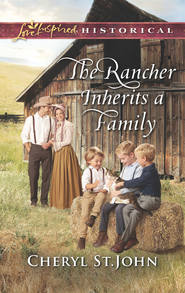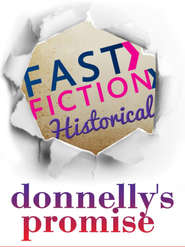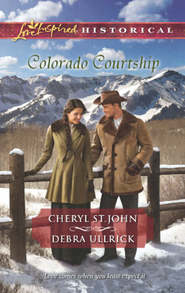По всем вопросам обращайтесь на: info@litportal.ru
(©) 2003-2025.
✖
The Lawman's Bride
Настройки чтения
Размер шрифта
Высота строк
Поля
“Better go see what’s left of the jail. Got some figurin’ out to do, I reckon.”
“Don’t worry about Miss Hollis,” Caleb told him. “She’s going to be just fine.”
Clay took a coin from his pocket. “Will a dollar cover it?”
Dr. Chaney closed his fingers around the coin with a grin. “I have a feeling she’s going to be madder’n a hornet when she finds out you paid.”
“She’ll just have to get her mind right about that,” Clay replied. He glanced out at the wagon still on the street. “Know anything about animals?”
“Know a little about horses.”
“Dogs?”
“Your dog out there?”
Clay nodded.
Caleb followed him down the walkway and through the arbor trellis laden with fragrant roses to the wagon bed.
Sam raised his head with a soft whine.
Caleb petted the animal, then turned him over and put an ear to his chest. “He was probably low enough to escape most of the smoke, unless he was directly in the fire.”
Clay shook his head. “I don’t think so.”
“He’s getting up there in years, isn’t he?”
Clay nodded. “Can’t see or hear much anymore. Doesn’t move farther than a few feet on his own.”
Caleb scratched behind the dog’s ear. “His old bones probably hurt something fierce.”
“I know there isn’t a miracle for the old boy.” Clay leaned a hip against the tail gate. “Just don’t have the heart to put ‘im down.”
“An injection would do it. It wouldn’t hurt him.”
Clay absorbed the words. “You could do it?”
The doctor nodded.
“I’ll be thinkin’ on it, Doc. Thanks.”
The driver was still waiting on the seat. “She gonna be okay?”
“She’ll be fine,” Clay called and offered the doc his hand. “Thanks again.” He climbed onto the wagon seat. As the driver pulled forward, Clay glanced back at the big white two-story house.
It was tough to imagine someone running into the burning jail for the sake of a dog. The impression he had of Sophie was one of a capable women. A woman sure of herself.
She claimed she’d seen the fire from the park and come to have a look. Alone in the park, an unprotected young woman on the streets of Newton at night—she was either fearless or foolish. It was his job to care which.
Ellie Chaney picked up a sleeping infant from the crib. “I’ll be right back as soon as I lie him down in my room.”
Sophie nodded. All she wanted was to sleep and with any luck escape the burning pain in her chest and throat. This kind stranger had helped her bathe and wash her hair, but the stench of smoke remained.
Ellie returned a few minutes later with a cotton night rail. “In the morning I’ll find something for you to wear home.”
“How did you know Mr. Webb’s name?”
“I used to work at the Arcade,” she replied. “Until I broke my arm. Caleb hired me to take care of his son, Nate, until I was better, and one thing led to another. Now here I am, crazy in love and married to him.”
“How old is your baby?”
She turned back the covers on the narrow bed with a smile. “Seven months. His name is David.” She paused a moment, then fluffed up a pillow. “I wasn’t sure I wanted a baby. Caleb had his own child when I married him, and we’re raising my two younger brothers. I had kind of a history, you could say.”
“I understand history.” Sophie had never said anything quite as revealing to anyone, and surprised herself by doing so. It must be because she was so tired and her chest burned so badly. She couldn’t resist asking, “What made you change your mind?”
She’d never believed she would make a good mother, so it was better that she spare a child the suffering.
“Caleb changed my mind. I didn’t know any good men before I met him. It took a while but I learned to trust him. And I learned to trust myself. Our life was good. Our marriage would have been fine just the way it was. But choosing to have a child together formed a deeper trust.”
Sophie studied the other woman, wondering what kind of history she spoke of, wondering if Ellie Chaney had a past that could even compare to Sophie’s. If she knew the people Sophie had known, she would have thought twice about bringing another child into the world. “Well, you seem very happy.”
“We are. Caleb is the kindest, most gentle man I’ve ever known.”
“You’re very fortunate.”
Ellie turned the wick on the lamp low. “I would never ask questions,” she told Sophie. “I know there are some things that can’t be shared. But if you ever need a friend or someone to talk to, I want you to remember I’m here.”
Had Ellie somehow seen right through her? Sophie’s throat tightened, adding to her discomfort. Her eyes had done nothing but burn and streak tears since she’d escaped that jailhouse. The high level of tension from the evening had obviously weakened her defenses. She wasn’t an emotional person. She was stronger than this. “Thank you.”
The woman wished her a good night and closed the door on her way out. Silence wrapped around Sophie. She imagined the handsome doctor and his pretty wife in their bedroom with their baby lying between them. They were kind and compassionate, unfamiliar qualities where she’d come from. Their generosity unsettled her thinking, shook her world. Were they normal? Was this what other people were like? She compared them to Amanda and Emma and the families they’d spoken of.
How many good people like these had been victims of Sophie’s deceit in the past? She couldn’t bear to think of it.
She glanced at the window, where the parted curtain revealed a slim portion of night sky. Newton was filled with dozens of neighborhoods and rows of houses just like this one—well, not all quite as nice, but similar homes where families dwelled.
Sophie squeezed her eyes shut and remembered a time many years ago, a time before her father had sold their home and bought a covered wagon, a time when she’d had older brothers—when her mother had tucked her in at night. The long forgotten memory of a rose-papered room and a small simple bed wavered at the edge of her mind. With that memory drifted the scent of lilacs on a summer night. Her mother’s perfume or fragrant bushes outside the window? She struggled to make the elusive memory clear, but it wavered and vanished.
All that was good and safe had changed along the westward trail when a Sioux war party had attacked their wagon train, and killed her father and her brothers. She and her mother had been taken captive. The chief had taken Sophie, adopted her and treated her well. Her mother had been given to a brave and had conformed to her life as a captive. She had advised Sophie to do the same. “You’re a brave girl, Sophie,” her mother had whispered. “Do whatever you must to stay alive.” Sophie had been following that advice all the years since.
They’d been in the Sioux camp five winters when her mother caught the typhus and died. In mourning her mother’s death, pain over the loss of her father and brothers surfaced, pain she’d avoided facing before. Acute loneliness had become her constant companion. To comfort her, the old chief had given Sophie her mother’s possessions, among them her mother’s gold wedding ring. Tek Garrett had taken the ring for safekeeping, that loss becoming the one regret she had in running away from him. She hadn’t dared tried to find it and suspected he kept it on him.
Sophie barely remembered family, scarcely remembered feeling loved. Her memories were distorted by time and anger. Getting up, she padded to the open window, drew aside the gingham curtain and peered into the night. The doctor’s house was one of the tallest in the neighborhood and afforded an expansive view of the neighboring rooftops.
The sky to the north was still hazy with smoke. Had the marshal bought her story? How crazy would it make him, wondering how that prisoner had been freed? The keys still hung in the lock, and the iron doors would be standing there when the marshals looked the place over tomorrow.
Damned sloppy job of making herself invisible.
Chapter Four











